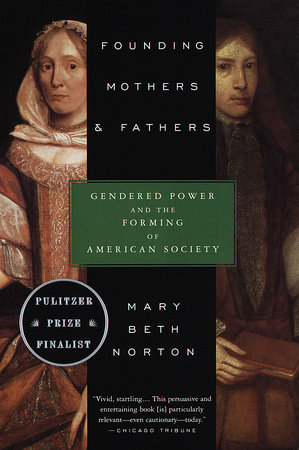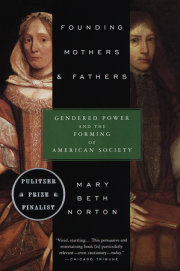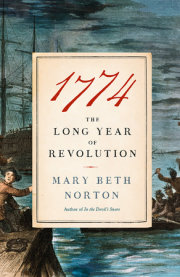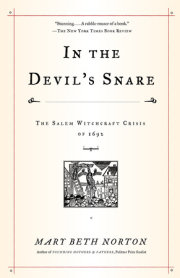Pulitzer Prize Finalist
In this pioneering study of the ways in which the first settlers defined the power, prerogatives, and responsibilities of the sexes, one of our most incisive historians opens a window onto the world of Colonial America. Drawing on a wealth of contemporary documents, Norton examines the first half-century of English settlement--approximately 1620-1670--and shows how the prevailing worldview of that time envisaged family, society, and state as similar institutions, demonstrating that because of this familial structure, women who wielded power in the household could also carry a surprising amount of authority outside of the home.
But she also discovers the beginnings of a new way of thinking as the eighteenth century approached: how an imbalanced ratio of women to men in the Chesapeake let the "Lockean" political system develop, one that drew a line between family and state and allowed women no formal role beyond the family. As she weaves theory and reality into a rich and revealing tapestry of colonial life, Norton gives students a new understanding of how America's first colonists viewed the power, prerogatives, and responsibilities of women and men while exploring the consequences of those beliefs everywhere from the bedroom to the magistrate's office.
"Norton has constructed a daring intellectual frame, a formula for understanding how and why the gendering of power operated in the two quite different cultures that developed in [colonial] New England and the Chesapeake."
--The New York Review of Books
"An important, imaginative book. Norton destroys our nostalgic image of a 'golden age' of family life and re-creates a more complex past whose assumptions and anxieties are still with us."
--The Raleigh News and Observer
"A provocative interpretation of colonial American society. As usual, Mary Beth Norton tells fascinating stories which rest on wide-ranging research. Founding Mothers and Fathers asks the right questions. It is a book which historians and political scientists will need to consider and which everyone interested in relations between men, women, and the state will want to read."
--Linda K. Kerber, University of Iowa
"Mary Beth Norton's founding mothers and fathers explode from the pages of seventeenth-century court records, speaking a language that sounds like English yet carries meanings radically different from our own. Norton's translations are both provocative and clear. She has given us a new set of founding events and a vocabulary that helps make sense of them."
--Laurel Thatcher Ulrich, Harvard University
"This innovative study integrates social and intellectual history in exciting ways. Firmly grounding her analysis in evidence from court records, Norton uses a comparative approach to show how contemporary worldviews affected social relations and structures of authority. The result is impressive insight into the role of gender in the exercise of power at every level."
--Lois Green Carr, Maryland State Archives
Table of Contents
Section One: Gendered Power in the Family
Prologue: The Government of Families
1. The First Society
2. A Little Monarchy
3. Free in Liberty
Section Two: Gendered Power in the Community
Prologue: Searchers Again Assembled
4. Communities of Men, Communities of Women
5. Amongst the Neighbors
Section Three: Gendered Power in the State
Prologue: His Lordship's Attorney
6. Fathers and Magistrates, Authority and Consent
7. Marvelous Wickedness
8. Husband, Preacher, Magistrate
Conclusion






